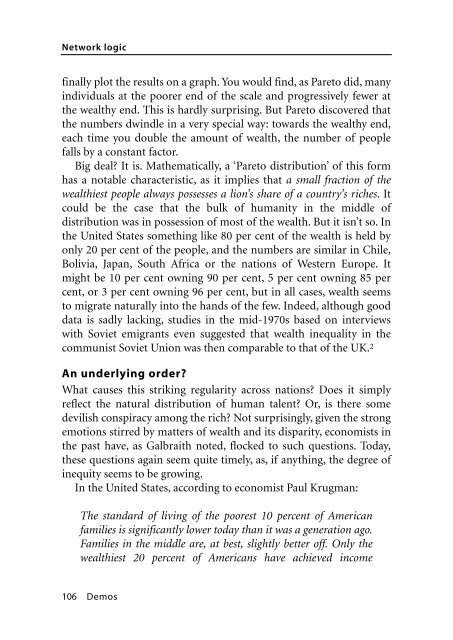Network Logic - Index of
Network Logic - Index of
Network Logic - Index of
You also want an ePaper? Increase the reach of your titles
YUMPU automatically turns print PDFs into web optimized ePapers that Google loves.
<strong>Network</strong> logic<br />
finally plot the results on a graph. You would find, as Pareto did, many<br />
individuals at the poorer end <strong>of</strong> the scale and progressively fewer at<br />
the wealthy end. This is hardly surprising. But Pareto discovered that<br />
the numbers dwindle in a very special way: towards the wealthy end,<br />
each time you double the amount <strong>of</strong> wealth, the number <strong>of</strong> people<br />
falls by a constant factor.<br />
Big deal? It is. Mathematically, a ‘Pareto distribution’ <strong>of</strong> this form<br />
has a notable characteristic, as it implies that a small fraction <strong>of</strong> the<br />
wealthiest people always possesses a lion’s share <strong>of</strong> a country’s riches. It<br />
could be the case that the bulk <strong>of</strong> humanity in the middle <strong>of</strong><br />
distribution was in possession <strong>of</strong> most <strong>of</strong> the wealth. But it isn’t so. In<br />
the United States something like 80 per cent <strong>of</strong> the wealth is held by<br />
only 20 per cent <strong>of</strong> the people, and the numbers are similar in Chile,<br />
Bolivia, Japan, South Africa or the nations <strong>of</strong> Western Europe. It<br />
might be 10 per cent owning 90 per cent, 5 per cent owning 85 per<br />
cent, or 3 per cent owning 96 per cent, but in all cases, wealth seems<br />
to migrate naturally into the hands <strong>of</strong> the few. Indeed, although good<br />
data is sadly lacking, studies in the mid-1970s based on interviews<br />
with Soviet emigrants even suggested that wealth inequality in the<br />
communist Soviet Union was then comparable to that <strong>of</strong> the UK. 2<br />
An underlying order?<br />
What causes this striking regularity across nations? Does it simply<br />
reflect the natural distribution <strong>of</strong> human talent? Or, is there some<br />
devilish conspiracy among the rich? Not surprisingly, given the strong<br />
emotions stirred by matters <strong>of</strong> wealth and its disparity, economists in<br />
the past have, as Galbraith noted, flocked to such questions. Today,<br />
these questions again seem quite timely, as, if anything, the degree <strong>of</strong><br />
inequity seems to be growing.<br />
In the United States, according to economist Paul Krugman:<br />
The standard <strong>of</strong> living <strong>of</strong> the poorest 10 percent <strong>of</strong> American<br />
families is significantly lower today than it was a generation ago.<br />
Families in the middle are, at best, slightly better <strong>of</strong>f. Only the<br />
wealthiest 20 percent <strong>of</strong> Americans have achieved income<br />
106 Demos
















